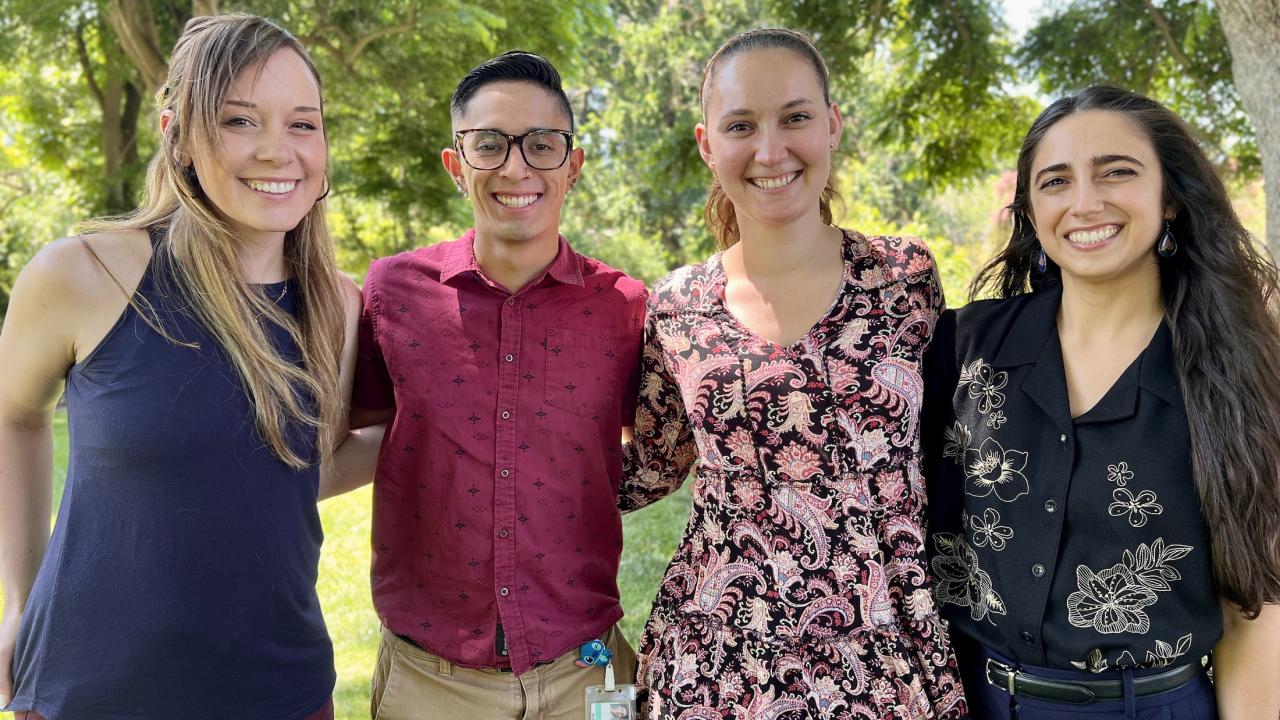
Prestigious NIH Awards Boost Career Opportunities for Future Clinician Scientists
Congratulations to Veterinary Scientist Training Program (VSTP) students Jenn Cossaboon, Chase Garcia, Erin Hisey, and Aryana Razmara for receiving prestigious National Institutes of Health (NIH) F30/F31 awards. As participants of the VSTP, these students are pursuing dual DVM and Ph.D. degrees, with the goal of becoming clinician scientists.
These NIH multi-year fellowships are crucial to achieving that goal by providing them with 60 percent tuition coverage, a stipend, an institutional allowance to defray the cost of health insurance, and a travel allowance to attend conferences. This financial support helps by furthering their research ambitions and training them to incorporate research and clinical skills in their future roles as clinician-scientists. In this way, they are given a very competitive edge for future careers as clinician-scientists.
The F30 Ruth L. Kirschstein Individual Predoctoral National Research Service Award is given with the purpose of “enhancing the integrated research and clinical training of promising predoctoral students” who are participating in a dual-doctoral training program and looking toward careers as clinician-scientists, according to the NIH website. The F31 National Research Service Award aims to “enhance diversity among the health-related research workforce” by supporting the research training of predoctoral students from populations traditionally “underrepresented in the biomedical, behavioral, or clinical research workforce.”
Cossaboon is a fourth year Ph.D. candidate under the mentorship of Dr. Swee Teh in the Integrative Pathobiology Graduate Group. She researches the legacy pesticide, DDT, and how it harms ovary development and fertility in the Japanese medaka, a translational fish model.
“The funding from VSTP is a once-in-a-lifetime opportunity and the benefits are endless; from preventing career-long debt, to providing health insurance and enabling me to attend conferences and network with leaders in the field,” she said. “When I graduate, I will be able to hit the ground running with more financial flexibility to pursue work that I care most deeply about, whether it be with wildlife conservation nonprofits or public health-based organizations.”
Garcia is a fourth year Ph.D. candidate and his research under the mentorship of Dr. Gino Cortopassi involves investigating a metabolic hypothesis for a specific subset of Alzheimer's disease.
“This line of direct funding is critical to my, and any researcher's, success as an independent scientist,” Garcia said. “In the future I want my career to incorporate basic research with a clinical application and being involved in the VSTP with this NIH funding sets me up very competitively to achieve my career goals.”
Hisey is a second year Ph.D. candidate under the mentorship of Dr. Brian Leonard in the Integrative Pathobiology Graduate Group, researching the interactions of the lipid components of the tear film and how alterations in those interactions can cause evaporative dry eye disease, as well as a novel lipid-based therapeutic for the disease.
“This financial support allows me to spend more of my time working on research,” she said. “This will help me to complete my program in a timely fashion so I can start my career as a clinician-scientist as soon as possible. Due to my funding from this F30 and fellowships, I will be a competitive applicant for future federal funding, such as a K award when I transition into my role as an independent clinician-scientist and R awards to support my research projects.”
Razmara is a second year Ph.D. candidate under the mentorship of Dr. Robert Canter in the Immunology Graduate Group researching immune cells called Natural Killer cells and their use in immunotherapy for dogs with naturally occurring cancer.
“I really value the F30/VSTP funding because along with the actual content of my research it also prioritizes my training, which includes my fantastic mentors and the many resources available to VSTP students at UC Davis,” she said. “The combination of research and clinical skills I learn during the VSTP program can then be incorporated together to maximize the potential of translatable studies in my future career as a veterinary clinician-scientist focusing on canine models as tools and beneficiaries of immunotherapy research.”
The F30 and F31 awards are highly selective and prestigious, speaking to the success in research training of the VSTP program and the talent that is represented by this program, from students to faculty members. Funding decisions by the NIH are made in large part based on the scientific and technical merit of the proposed project, as well as the training potential.
“I'm excited to see our students having such great success rates in obtaining this NIH-funded pre- doctoral training award,” said VSTP Director Dr. Bethany Cummings. “These successes speak to the wonderful and talented group of students and faculty mentors that we have in the VSTP program. These prestigious awards will supplement and advance the already stellar training that our students are receiving.”
